tita – Letizia Patriarca (Mecila Junior Fellow, 2025)
O Museu das Favelas, em toda sua diversa potência, nos fez atravessar lutas sociais diversas, expressões de festa, sonoridades e estéticas periféricas, que criam linguagens próprias, muito além do imaginário recorrente sobre as favelas.
Era um dia frio, mas a visita ao Museu das Favelas foi de aquecer os ânimos. Até saiu um pouco de sol para a foto da fachada. Contrastavam o azul do céu, a colonialidade do prédio e toda a força pulsante e incapturável do que se vivencia n(o museus d)as favelas.
Emanava certa imponência, que eu diria que não vinha do prédio histórico, com sua arquitetura colonial e muito bem reformado, ao lado do igualmente histórico e colonial espaço dos jesuítas no Pátio do Colégio, no centro da cidade de São Paulo. Para mim, era a fala de educadories, pesquisadories e a intensa circulação de dezenas de jovens, com animação, tirando selfies por todo museu, que dava todo o gás.
Vera e Mônica Cardim organizaram em família essa visita, que recebeu também a minha família, além de quem pesquisa no Mecila. A questão racial se impunha a partir de nossos corpos, entre pessoas negras, brancas, alemãs, italianas e brasileiras, que trabalham e pesquisam dentro e fora do museu.
Esse contínuo movimento de troca de saberes, dentro e fora, é um dos objetivos do museu e da Biblioteca CRIA. Começamos então nossa visita, com Claudia Onorato e Sidnei Rodrigues contando do acervo e de suas atividades, que incluem lançamentos de livros no primeiro sábado do mês.
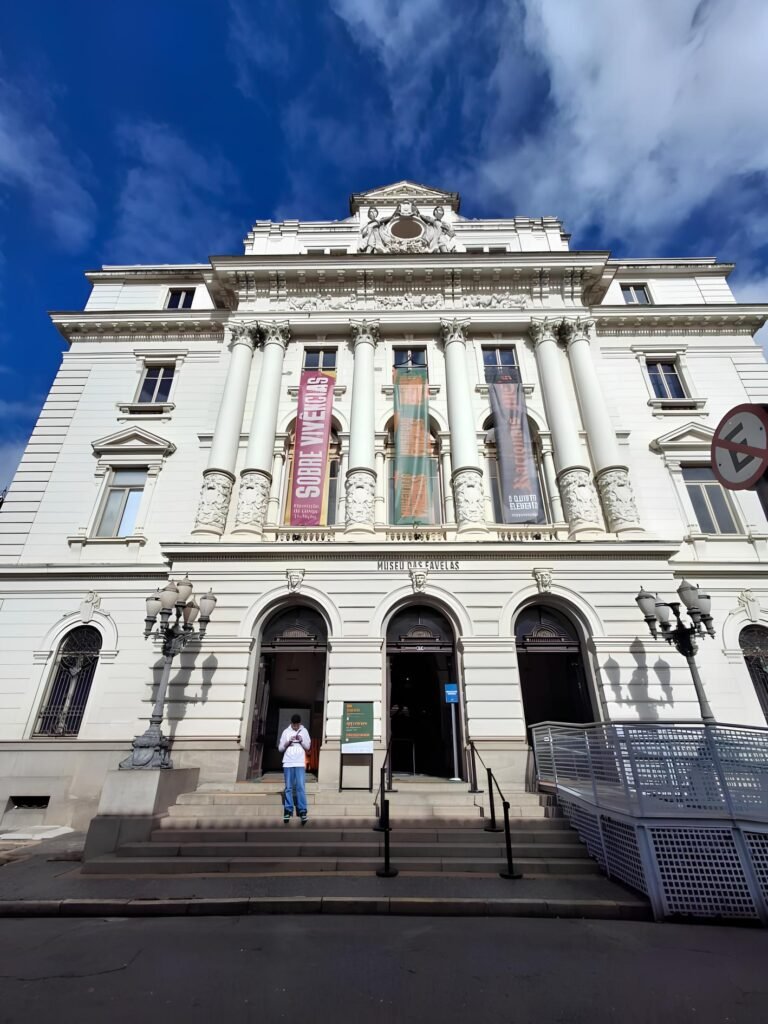
Foto da autora.
A biblioteca também recebe doações de livros, com foco principal nas temáticas sobre favelas e periferias, dando destaque para escritores e escritoras periféricos independentes, e pesquisadores. Dentre as palavras ACOLHIMENTO e PERTENCIMENTO, raios de luz entravam e faziam brilhar autorias como Sueli Carneiro e Itamar Vieira Junior nas capas de livros do acervo.
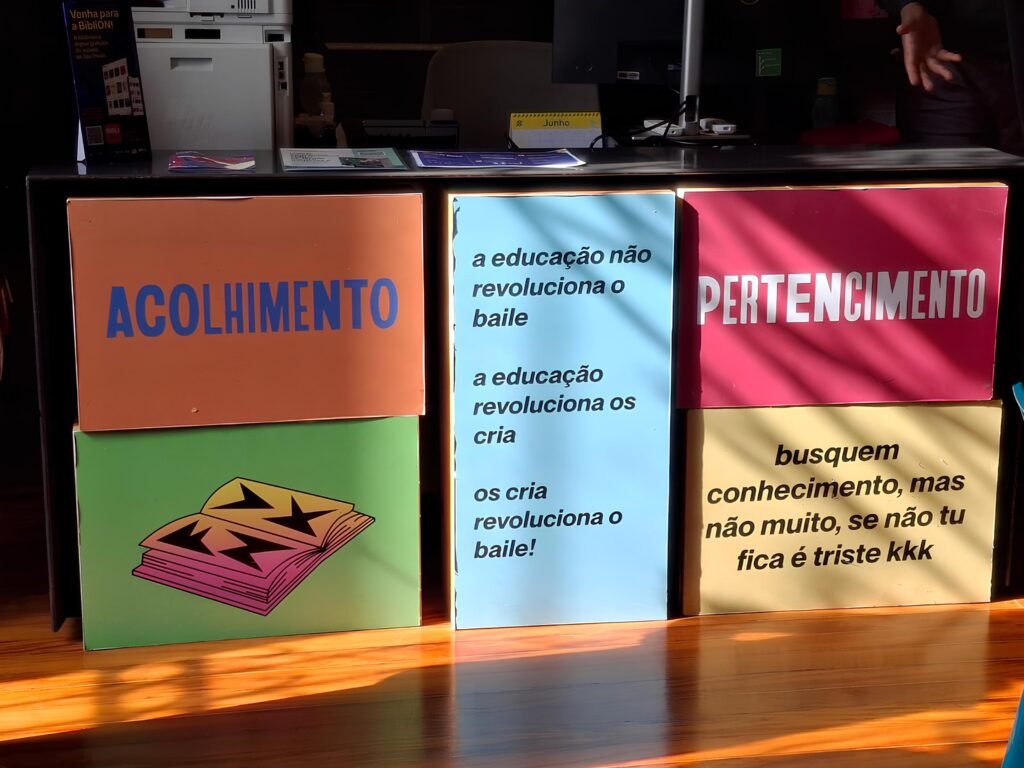
Biblioteca CRIA (foto da autora) e Vera Cardim (foto de Jasmin Wrobel).
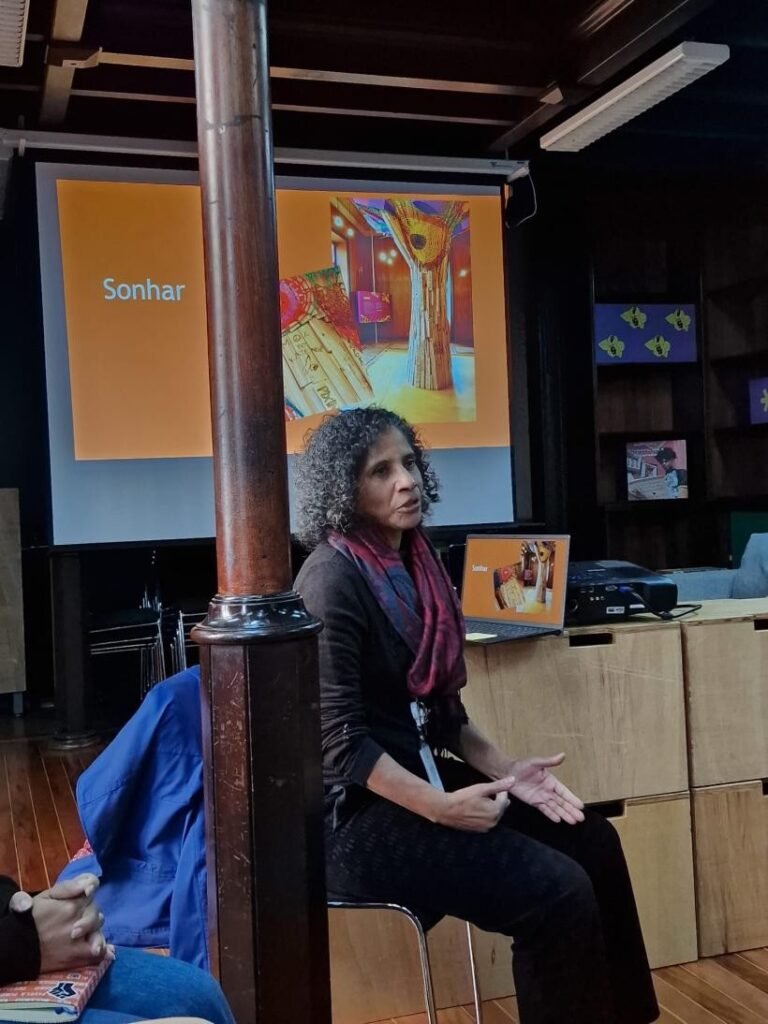
Seguimos para um momento de partilha, com a museóloga Danieli Leite, a pesquisadora Érika Augusta e a coordenadora Vera Cardim. Nossos interesses de pesquisa foram rapidamente trocados, para também conhecermos a “Pesquisa de Cria: Encontro de Saberes”. Esse projeto promove encontros presenciais com pessoas pesquisadoras acadêmicas e não acadêmicas e grupos e lideranças periféricas, para compartilhar saberes e experiências de atuação a partir de múltiplas fontes, linguagens e expressões. Dentre os encontros recentes, destacaram um com mulheres trancistas, em que foi possível unir, em práticas artísticas, pertencimento e desenvolvimento econômico através do cabelo a um encontro de promoção de saúde mental.
Desde a recente fundação do museu, foi ressaltada a importância de representar a pluralidade de corpos e vivências, também refletida na equipe. Atualmente o museu conta com cerca de 80% de pessoas pretas e pardas, sendo cerca de 40% mulheres negras. Quase metade da equipe se identifica como LGBTIAPN+.
A coordenadora Vera Cardim apresentou o histórico e todo o intenso e diverso trabalho que a equipe faz. Segundo ela, “as necessidades são diversas, questões atravessam”, de forma que não podia ser só um museu de arte. Por isso, inclui diversas atividades de troca de saberes e pesquisa.
Fundado em 2022, o Museu das Favelas se encontrava originalmente na região dos Campos Elíseos, mas teve que deixar o espaço por conta de políticas violentas de gentrificação, inclusive contra a Favela do Moinho. Essa mudança de território foi evidenciada porque se conecta diretamente com políticas e discussões que envolvem o museu. Também abriu espaço para a discussão sobre o que seriam favelas e sua infinita pluralidade, não se restringindo a territórios afastados do centro da cidade.
Apesar de recente, o Museu das Favelas é bastante visitado e tem grande visibilidade nas redes sociais – o que pudemos observar com o intenso movimento de jovens nos três andares, acessíveis por escadas e elevador. Além de exposições no espaço do museu, o Museu das Favelas também conta com exposições virtuais: atualmente estão em cartaz Favela-Raiz, O samba merece um palácio e Funkeiros cults 3D.
No último andar encontra-se a sonora e imersiva exposição temporária Racionais Mc’s: O quinto elemento, em cartaz até 31 de agosto. A diversidade de materiais, de discos e cartas a vídeos de bastidores, permite acompanhar a história do Brasil dos últimos 35 anos através do famosíssimo grupo de rap. Os integrantes Mano Brown, Edi Rock, KL Jay e Ice Blue são apresentados em detalhes, com toda força poética e crítica, através dos saberes que produziram em seus discos e atuações na vida.

Fotos da autora. À direita, abaixo, foto de Ernesto García.
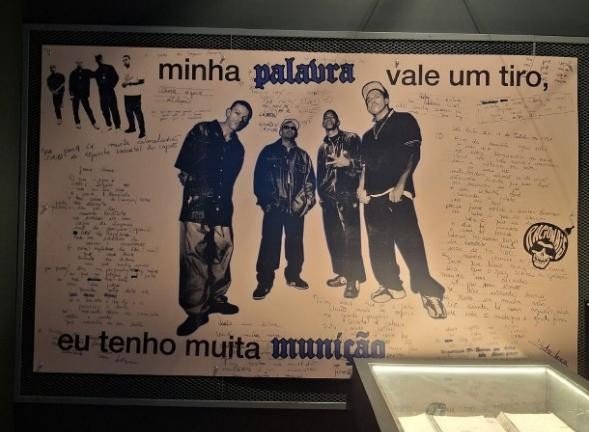
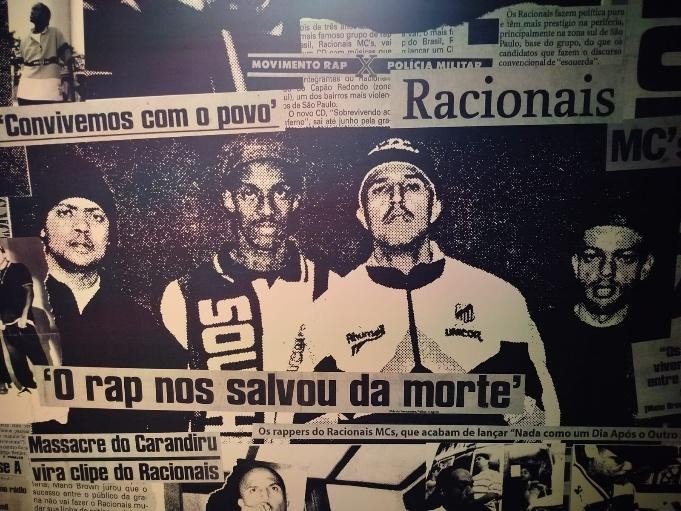
Nos primeiros andares, o Museu das Favelas conta com sua primeira exposição de longa duração, Sobre vivências. Reunindo manifestações culturais de artistas periféricos e coletivos e objetos fruto de reflexão coletiva de diversas comunidades, a exposição está organizada em cinco módulos. Cada módulo busca refletir a multiplicidade dos territórios e das vivências das favelas, sem jamais definir o que seriam. Para refletir a diversidade das vivências nas/das favelas, cada módulo conta com verbos no infinitivo: SER, EXISTIR, MORAR, CELEBRAR e SONHAR.
O Museu das Favelas, em toda sua diversa potência, nos fez atravessar lutas sociais diversas, expressões de festa, sonoridades e estéticas periféricas, que criam língua(gens) próprias, muito além do imaginário recorrente.
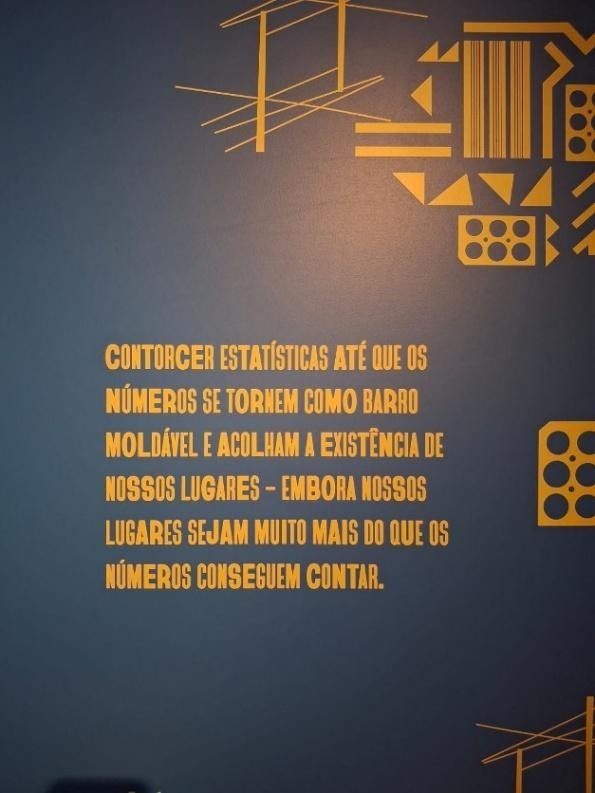
Exposição Sobre vivências. Fotos da autora
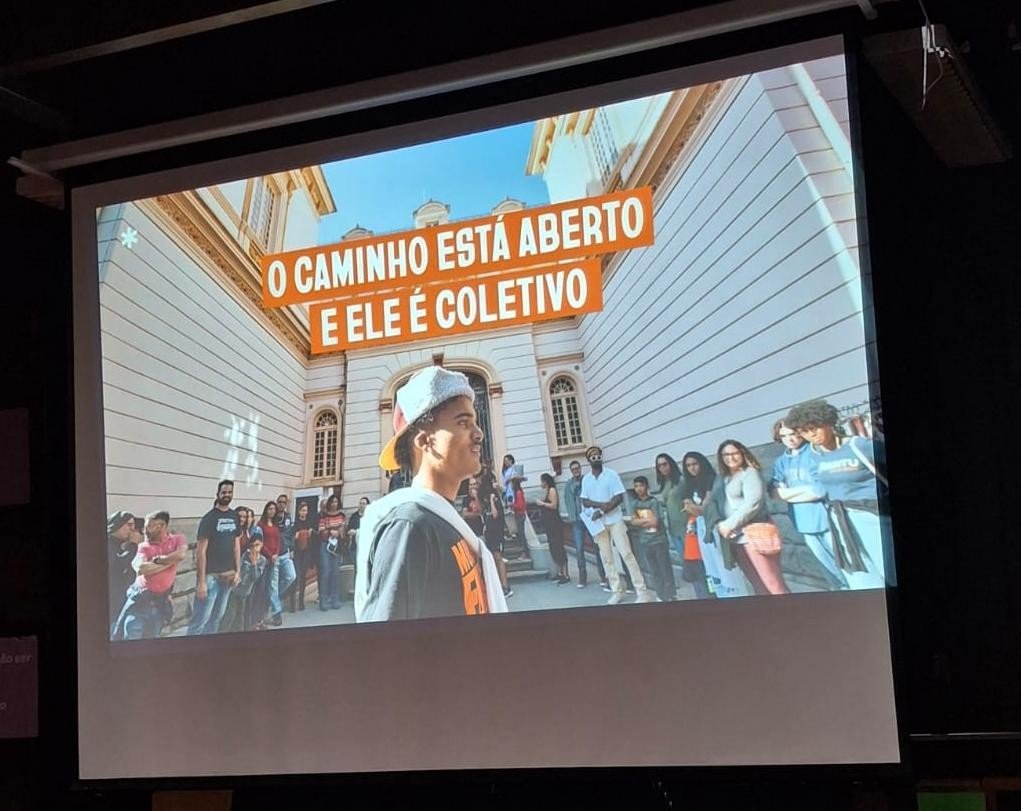
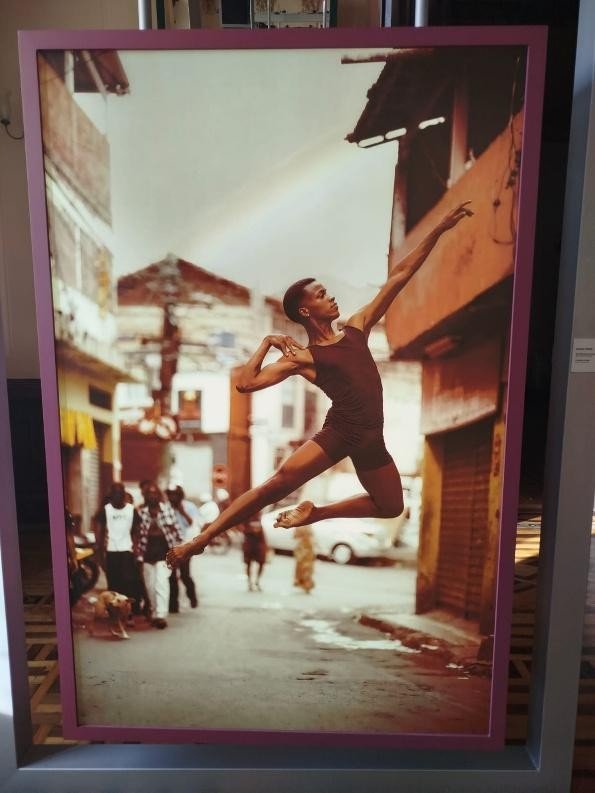
Foto: Ernesto García
